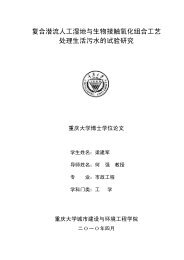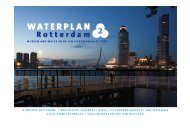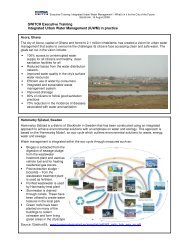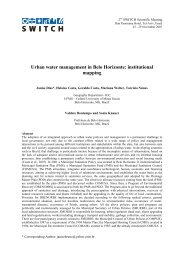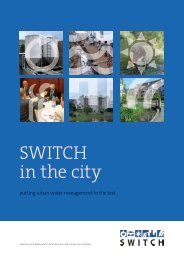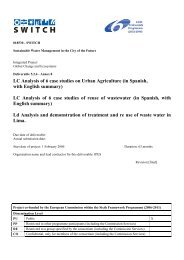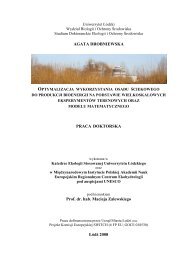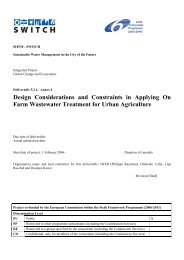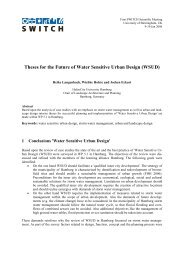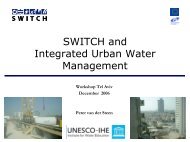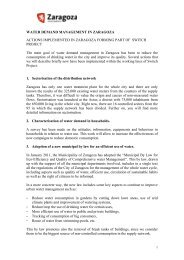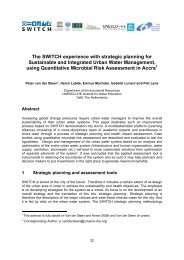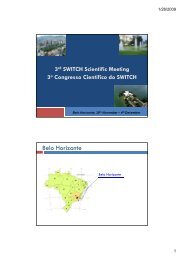Systems Analysis of Zaragoza Urban Water - SWITCH - Managing ...
Systems Analysis of Zaragoza Urban Water - SWITCH - Managing ...
Systems Analysis of Zaragoza Urban Water - SWITCH - Managing ...
Create successful ePaper yourself
Turn your PDF publications into a flip-book with our unique Google optimized e-Paper software.
<strong>Systems</strong> <strong>Analysis</strong> <strong>of</strong> <strong>Zaragoza</strong> UWS<br />
Guillermo Penagos<br />
1 Introduction<br />
Approximately half <strong>of</strong> the world’s population is nowadays living in cities. This percentage<br />
is increasing and so is doing their demand for natural resources as well as their pollution<br />
loads to the environment. It is reasonable to assume that if cities can become<br />
sustainable then society as a whole will follow the tendency. A key aspect on<br />
sustainability <strong>of</strong> the cities is the urban water system (UNESCO, 1999; Hellstrom et al,<br />
2004).<br />
A sustainable urban water system should provide its services while protecting human<br />
health and the environment, with an optimum use <strong>of</strong> scarce resources over a long term<br />
perspective (ASCE, 1998). There is a strong need <strong>of</strong> developing and implementing<br />
indicators that make the concept measurable by quantifying trends towards optimization,<br />
not just <strong>of</strong> existing water and wastewater technologies but <strong>of</strong> urban societies as a whole<br />
(Larsen and Guier, 1997).<br />
Along the whole urban water cycle, important impacts on the environment take place:<br />
water is consumed, as well as energy and chemical products. On the other hand organic<br />
matter, nutrients and persistent pollutants are entering the ecosystems. A quantification<br />
<strong>of</strong> all these negative effects upon the environment is considered to be a good indicator <strong>of</strong><br />
environmental sustainability (Larsen and Guier, 1997; Varis and Somlyody, 1997;<br />
Lundin; 1999).<br />
This study aims to analyze the environmental performance <strong>of</strong> <strong>Zaragoza</strong> <strong>Urban</strong> <strong>Water</strong><br />
System in Spain with regard to the use <strong>of</strong> natural resources and pollutant loads to the<br />
environment. The use <strong>of</strong> natural resources is assessed with regard to water withdrawal<br />
as well as energy and chemical products consumption. Considered pollution loads are<br />
atmospheric emissions, oxygen demands to the river, nitrogen, phosphorus and heavy<br />
metals. Such analysis will serve as baseline information for further assessment <strong>of</strong><br />
sustainable development. This research work only deals with the operational aspects <strong>of</strong><br />
the UWS and does not include construction, upgrading and demolition <strong>of</strong> infrastructure.<br />
The present research is included within the <strong>SWITCH</strong> project framework, program 1<br />
which aims to assess the adjustability <strong>of</strong> <strong>Urban</strong> <strong>Water</strong> <strong>Systems</strong> to global change<br />
pressures from a strategic approach based on sustainability and risk assessment.<br />
8



